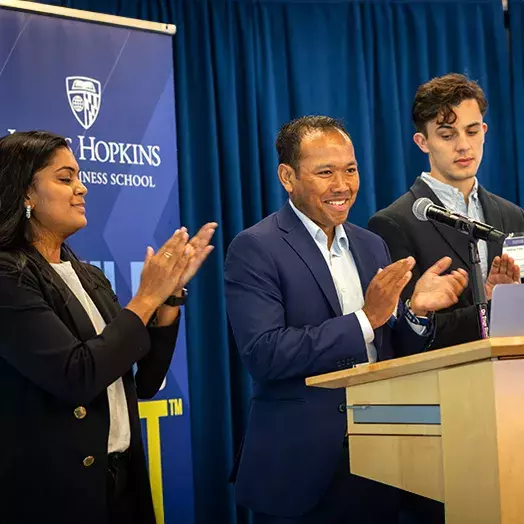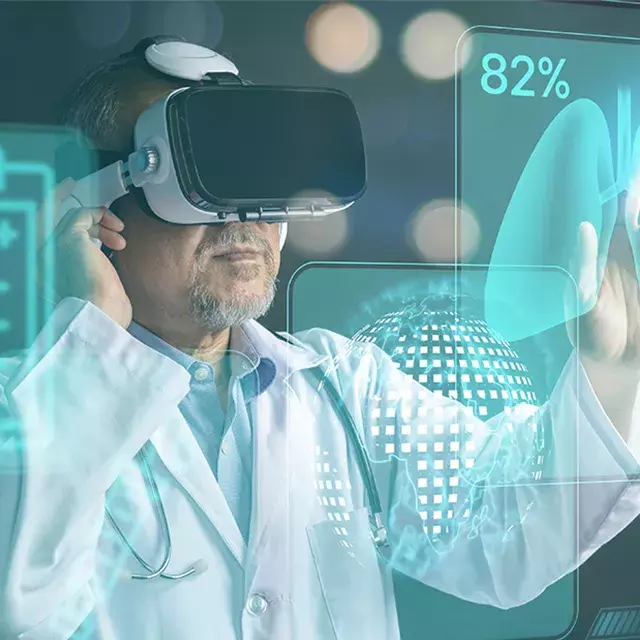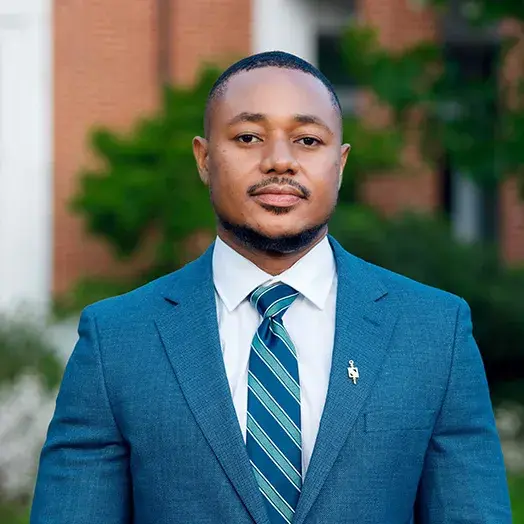Carey students lead Hopkins Healthcare Business Conference to explore the impact of AI and policy on the future of health.

Emerging technologies and greater equity to shape the future of health
From the wheel to the internet, technological advances have revolutionized human existence. But who benefits from these wondrous innovations, and do some groups benefit more than others?
Those questions struck at the heart of the Hopkins Healthcare Business Conference. The annual event, re-energized and driven by students, drew more than 200 other students, faculty, and experts from the health technology industry.
Health inequities are growing in the U.S. and worldwide. According to recent studies funded by the National Institute on Minority Health and Health Disparities, the economic burden of racial health disparities in the U.S. is $451 billion.
At the same time, technological advancement has created inequities in wages and education. According to the National Bureau of Economic Research, between 50 and 70 percent of changes in U.S. wages since 1980 can be attributed to wage declines among blue-collar workers replaced or degraded by automation. The burden from education-related health disparities is $978 billion.
AI and health
Wm. Polk Carey Distinguished Professor and Center for Digital Health and Artificial Intelligence Co-director Ritu Agarwal told attendees during her panel discussion on the legal and ethical implications of AI in the health sector that society was nearing an “inflection point” between the ubiquitous presence of AI and persistent racial disparities and health inequities.
“When these two realities collide, we have the potential for a perfect storm, which could lead to dreadful outcomes or it could yield remarkable opportunities,” she said.
Further illustration came from Duke Margolis Center for Health Policy Research Director Rachel Henrick-Sturrups. “Are we building AI in order to get people what they need at the right time in the fastest way possible? Or are we building it in a way that's going to increase the likelihood that won't happen? That's a very big question. I think all of you should probably think about it after today.”
Agarwal added, “The prospect of biased AI is scary in all domains, but especially so in healthcare where decisions have life and death consequences. I think anybody here who's involved in applying digital tools, algorithms, developing systems for healthcare needs to put in an extra layer of caution to make sure there's no bias.”
Making health policy equitable
Johns Hopkins Bloomberg Distinguished Professor of Health Economics and Hopkins Business of Health Initiative Director Daniel Polsky led a separate discussion around the concept of equity and the future of health from a policy perspective. It included societal aspects like housing, criminal justice, and transportation, as well as aspects of the health care delivery system.
“I think we need to understand that there is a significant amount of money that we are losing just because we are not able to take care of the health inequities,” Johns Hopkins Healthcare Medical Director Aisha Rahim told attendees. “To say that if we are going to make a national policy alone may not be sufficient. We have to be working at national, state, and local level, a world economic forum.”
And if an ounce of prevention is worth a pound of cure, does policy create a disadvantage by denying a right to non-emergent health care?
“We don't have from a policy perspective, a right to health care in the United States,” panelist Adam Myers, the former chief clinical transformation officer for Blue Cross Blue Shield. “When someone's life or limb is in jeopardy, then you have the right to health care regardless of your ability to pay. But up until that point, you don't unless you have a means to access it and support yourself through that process.”
Building the future of health care
Carey students Vidith Huot (MBA) and Sunny Roy (MBA/MPH) were two of the driving forces behind this year’s Hopkins Healthcare Business Conference. As members of the Johns Hopkins Graduate Healthcare Business Association, they wanted to “re-energize” Carey’s annual health care conference and engage members of the Johns Hopkins health ecosystem around the theme of building the future of health care. This year, the Healthcare Business Association collaborated with the Hopkins Business of Health Initiative, an interdisciplinary research center that works across Johns Hopkins.
“There's so much opportunity to marry the health care piece with the business piece, and there's so much thought leadership,” Huot explained. “We really wanted to try to make this a Hopkins-wide event where we bring in faculty to moderate and also to speak on some of these different topics within the different verticals in health care,” he said.
What to Read Next

research
Malpractice concerns impact physician decisions to consult AIRoy, who is an HBHI fellow, noted that graduate students from health disciplines don’t always connect business to health or concepts like value-based care or artificial intelligence, or health equity. “We wanted to show the audience just how broad health care interests can be, and also to help make the connections with those who are already in that field,” Roy said.
In addition to Agarwal and Polsky, Johns Hopkins Whiting School of Engineering Director of Strategic Management Adler Archer and Johns Hopkins Bloomberg School of Public Health Vice Dean Joshua Scharfstein sat on panels. From the business-in-practice side, Accenture Federal Services Managing Director of Data and AI for Health Kenyon Crowley and Prudential Vice President of Corporate Counsel Tamra Moore joined Rahim and Myers.
In February, Carey Business School was named by Poets & Quants as one of the "10 business schools to watch in 2024" in part for its leadership in the business of health and its collaborations across Johns Hopkins.


